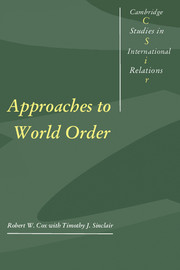Book contents
- Frontmatter
- Contents
- Preface
- Acknowledgements
- Part I Overviews
- Part II Theory
- 3 The idea of international labor regulation (1953)
- 4 Realism, positivism, and historicism (1985)
- 5 On thinking about future world order (1976)
- 6 Social forces, states, and world orders: beyond international relations theory (1981)
- 7 Gramsci, hegemony, and international relations: an essay in method (1983)
- 8 Towards a posthegemonic conceptualization of world order: reflections on the relevancy of Ibn Khaldun (1992)
- 9 “Take six eggs”: theory, finance, and the real economy in the work of Susan Strange (1992)
- Part III Interpretations
- Part IV Multilateralism
- Complete bibliography of works by Robert W. Cox to 1995
- Index of names
- Index of subjects
- CAMBRIDGE STUDIES IN INTERNATIONAL RELATIONS
4 - Realism, positivism, and historicism (1985)
Published online by Cambridge University Press: 05 June 2012
- Frontmatter
- Contents
- Preface
- Acknowledgements
- Part I Overviews
- Part II Theory
- 3 The idea of international labor regulation (1953)
- 4 Realism, positivism, and historicism (1985)
- 5 On thinking about future world order (1976)
- 6 Social forces, states, and world orders: beyond international relations theory (1981)
- 7 Gramsci, hegemony, and international relations: an essay in method (1983)
- 8 Towards a posthegemonic conceptualization of world order: reflections on the relevancy of Ibn Khaldun (1992)
- 9 “Take six eggs”: theory, finance, and the real economy in the work of Susan Strange (1992)
- Part III Interpretations
- Part IV Multilateralism
- Complete bibliography of works by Robert W. Cox to 1995
- Index of names
- Index of subjects
- CAMBRIDGE STUDIES IN INTERNATIONAL RELATIONS
Summary
In the range of their different arguments, I find myself in agreement and in disagreement with aspects of each of the other authors' texts. I am, however, left with the general impression that this is a specifically American debate even though it is couched in terms of international or world systems. Stanley Hoffmann put it that international relations is an American social science. This is not (on my part any more than on Hoffmann's) to suggest that American thought is cast in a single mold. (I protest in advance my innocence of Robert Gilpin's strictures against lumping together authors whose views differ in important respects.) What is common, it seems to me, is (1) the perspective of the United States as the preponderant of the two major powers in the system and consequently the sharing of a certain measure of responsibility for US policy, and (2) the organization of argument around certain obligatory themes of debates, notably those of power versus morality and of science versus tradition. The first of these is, to employ Waltz's language, a systemic conditioning of American thought. The second derives more from an explicitly American cultural process. One aspect of this process was the intellectual conversion of US policy makers to the use of the accumulated physical power of the United States for the performance of a world system-creating and system-maintaining role. Important influences in this conversion were European-formed thinkers like Reinhold Niebuhr and Hans Morgenthau who introduced a more pessimistic and power-oriented view of mankind into an American milieu conditioned by eighteenth-century optimism and nineteenth-century belief in progress.
- Type
- Chapter
- Information
- Approaches to World Order , pp. 49 - 59Publisher: Cambridge University PressPrint publication year: 1996
- 9
- Cited by

